#but like....if IF Roland and Olivier are supposed to be a reference to Roland and Oliver....
Explore tagged Tumblr posts
Text
Wait, I'm stupid. Is Roland and Olivier from Vanitas no Carte supposed to be referencing Roland and Oliver?? The classic French friend duo who died tragically trying to win a battle that was rigged against them? Who were loyal to the other to the point of death despite Oliver being the literal braincell in the friendship and warning against Roland's pride? Who were almost brothers but couldn't be ala them dying before Roland could marry into the fam via Oliver's sister?
Because if it is...what could it MEAN?
#I'm not deep into the vnc fandom...just watched the anime and thought it neat and promptly focused all my attention on Noe#well noe and murr....#but like....if IF Roland and Olivier are supposed to be a reference to Roland and Oliver....#then sjrhhrjsjajehrhrhskskoeh i may have yo look deeper into the manga#you guys dont understand im obsessed (like lowkey...doesnt really affect my life like some fandoms do) with the Song of Roland#its the commentary on pride and friendship and the notion of chivalry and glory and that anglo saxon notion of mod#despite it being french the whole not asking for aid and glory thing sort of made me think of the anglo saxon thing about mod#plus roland is like...obsessed with his ideals up until death comes and its too late#and i just....#fandom spamdom#vnc#vanitas no carte#note's nonsense#the song of roland#listen my comprehension skills STINK esp for classics so obligatory disclaimer and apology if i got song of roland off#anyway shout out to a roland gifset making me think this
81 notes
·
View notes
Text
VNC Chapter 44 Analysis
Well, I think the main takeaway most people had with this chapter is that Vanitas is a lot less collected than we all thought. And I completely agree. XD Clearly, I've given this fellow too much credit in my fanfic.
Anyhow, it almost goes without saying that we learned a lot about Vanitas in this chapter, but we also learned a surprisingly large amount about Roland, so let's dig in.
The first thing that struck me as noteworthy was Noé's complete and utter overreaction. We already knew that he never really had to do things for himself with Louis and Dominique constantly taking care of him when he was young. For example, Mochizuki pointed out that they always helped him clean his room, and he is now terrible at being tidy. In other words, Noé was a touch spoiled. This is relevant because it explains why he has never had to take care of an ill person once in his life, so if Vanitas says he can't continue on then, by Noé's logic, he really must be dying.
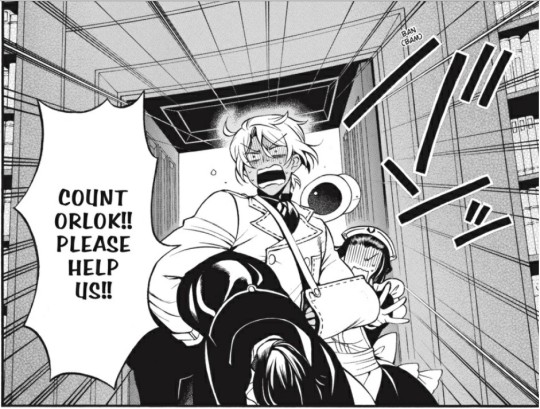
Thus, it's completely fair when Manet and Nox wonder if these two are children; they're both certainly acting like it. XD
Still, Noé is coming from a place of genuine concern; he's never seen Vanitas act like this just like we haven't.

Before I move on, one thing I'd like to point out is the difference between Noé and Luca's reaction to the people they care about acting oddly. Luca immediately goes to someone he knows Jeanne trusts--a friend in other words. Meanwhile, Noé goes to the nearest authority figure he can find: Count Orlok. I think this is telling on both their parts.
Luca is someone who was raised to be the authority figure. While he doesn't like it even remotely, he knows he has to solve things for himself. He probably also knows the value of going to someone you know you can trust; he's surrounded by the aristocracy and he knows you can't trust just anyone with delicate information.
Noé has blind faith in authority figures on the other hand. He obeys Teacher without question, accepts Ruthven's presence in his hotel room as something he has a right to do in chapter 19, and he always listens to Dominique no matter what. Both she and Teacher are the ones that choose what his clothes look like according to the extra in the back of volume 3.
I suppose what I'm getting at is that Noé is very comfortable, accustomed even, to other people making decisions for him. He's not the one who has chosen most anything in his life, and I think this attitude started when he was very young. Certainly being sold as a slave and accepting that whoever bought him would be his "master" was a mindset he probably had to develop to survive and he may not have fully grown out of it. I'm sure it was only compounded by being surrounded by people who doted on him and protected him and made sure he never even had to make a decision for himself. His attitude is born of a very strange mix of neglect and indulgence.
In other words, Noé has a lot of potential problems he needs to sort out, and I'm sure his independence is going to be one of them.
Getting back on track, all of this is to say it's not surprising Noé goes to Count Orlok when he can't find Amelia. In theory, he could have tracked Dante down, someone Vanitas sort-of trusts, but he doesn't. It could because it would have been too hard to find him, but personally I don't think it even crossed his mind. He doesn't know what to do; someone else is supposed to handle these matters.
As for Vanitas, he is a complete wreck in this chapter. XD I think Vanitas is the kind of character that likes to act like he's calm, collected, and definitely knows what he's doing. It's even easy for us, the readers, to think the same because he has the book, he has the powers, he knows all about vampires when even the vampire protagonist doesn't, so it would make sense.
But all of that ignores the fact that Vanitas has also shown some definite signs of being slightly unhinged in awkward social situations from the very start. How does he befriend Noé? He stalks him all across Paris. How does he react when Noé gets closer to understanding him? He draws a dagger at him and tells him to go away. Alternatively, he calls him a slur and tries to make him leave. How does he handle Dominique accusing him of loving VotBM? He goes on a full-blown rant in the middle of a vampiric ball and generally makes a fool of himself.
So, the fact that he's a complete mess when he realizes he has genuine affection for someone is actually a lot less surprising in this context. Vanitas is trying to be someone he isn't. In other words, all that pompous know-how is a complete facade. 8D
So, in line with him making a fool of himself at the ball, he proceeds to make a fool of himself in front of Orlok, Nox, and Manet and, frankly, Noé.
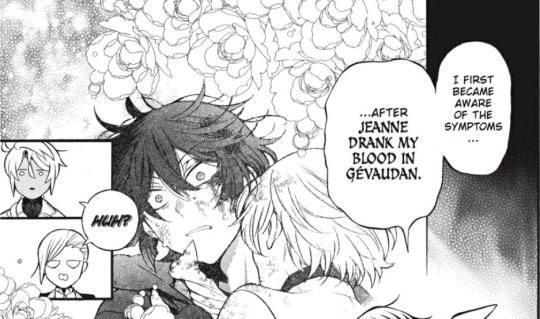
Manet understandably wasn't expecting this information, but what's more interesting is that it confirms the fact that Vanitas really hadn't told Noé a thing after Gévaudan. The fact that he has now snapped and is telling everyone in the whole room shows just how affected he was. But what's also interesting is that he only starts to talk about this when there are other people. He couldn't just tell Noé himself. Perhaps because he thinks Noé won't have any advice?
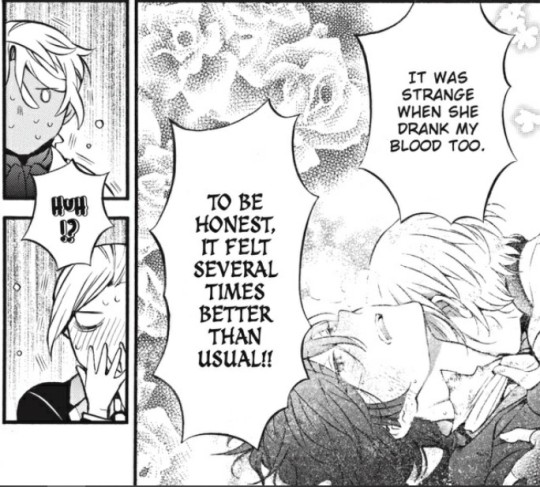
And this is the definition of oversharing. XD Even Noé looks like he's wondering what on earth Vanitas is saying.
Honestly, this is more the kind of awkward, wildly inappropriate confession I might expect from Noé except that Noé would have the sense to only say something like this to someone he trusts, like when he told Dominique he thought Vanitas's blood smelled good. Still not the most tactful thing, but a whole lot better than describing, in some detail, the torrid affair you're having to a room full of people you barely know. 8D
As a side note, this pretty much confirms what I was saying in my last meta: Vanitas didn't enjoy Jeanne drinking his blood previously, at least not all that much. This time he did, and that definitely shows a shift in their relationship. As for how all of that works, it could be because Jeanne is fonder of him as well. Perhaps a vampire's toxin is in tune with that kind of thing? Unfortunately, we just don't know enough at this point to say.
Regardless, it means that when Vanitas went on that long rant to Jeanne in chapter 12 about how great it felt when she drank his blood and how they were definitely compatible, was yet more lying. It's kind of, possibly, true now though, hence his freakout.
Anyway, Orlok and co. decided Vanitas's "emergency" really wasn't that much of an emergency and they were understandably kicked out. I like that they were apparently very careful with Murr and included some treats for him as well. They really do love that cat. Knowing what we kind of know about Murr now I have to wonder: is this some kind of elaborate manipulation...?
But Noé, apparently still taking Vanitas's malady very seriously despite all that weird stuff about Jeanne, is not content with being kicked out.

I suppose the point here is that, despite knowing what Vanitas said was improper, he still isn't quite catching the gravity of things, and he's still convinced Vanitas is dying rather than having an existential breakdown over love.
Meanwhile, Vanitas is walking around in a haze in Paris, thinking about Jeanne, her smile, and the promise he made her. We get a look at his face, and I think it actually gives some pretty solid insight into what he's thinking:
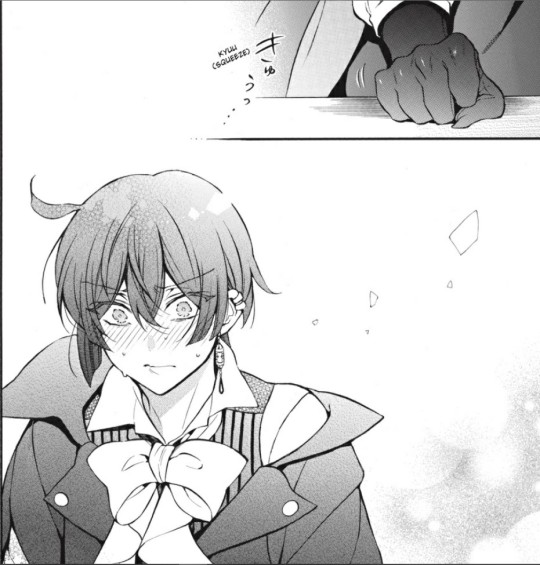
He clenches his fist, his face is flushed, and he looks worried, distressed. The problem here isn't just that he cares about someone and doesn't know how to deal with it. No, it's actually much worse than that: he cares about someone and he promised he'd kill her if she ever lost herself and Vanitas, cursed with a certain understanding of just how bad things can get, knows he might actually have to keep this promise, a promise he may now regret making.
So, he's flustered because he cares, frightened because he cares, but also terrified because he knows things can only go badly from here. And, more than anything else, he knows he might actually be in love.

It only makes sense he'd think of No��'s original question here. It's not just that Noé is the one who's been trying to figure all this out (not Vanitas), but Vanitas knows Noé is the reason he's gotten into this much "trouble" in the first place. Opening up, caring about people, making promises he might not be able to keep... He is definitely blaming Noé for all of that. I wouldn't be surprised if he finds a way of blaming Noé for his romantic entanglement as well, which may be the actual reason he's avoided talking to Noé: he blames him, but he's also supremely embarrassed.
And in the midst of all this confusion and pain who is added to the picture? None other than our one and only Roland!

I think that might be my favorite image of the whole chapter. XD
Earlier in this meta I mentioned that we almost learn more about Roland in this chapter than anyone else, and it's thanks to Vanitas's exchange with him that we do!
The first thing we learn about Roland is something we've already had inklings of in earlier chapters: he's far more tactful and calculative than he would have people believe. He refers to Vanitas as "Vincent" and says Olivier is his coworker. Immediately, he has established that, for one, he's very good with details. He remembers exactly how Vanitas introduced himself and Noé when they first met. Furthermore, he knows Vanitas likely doesn't want to get further entangled in chasseur affairs, so he lets him know that he isn't with a random friend: this is someone potentially dangerous to Vanitas.
Not that it does much good because Vanitas isn't exactly thinking clearly.

This one, singular statement from Olivier is surprisingly revealing! I'd had a headcanon that Roland has had past relationships and it turns out that is absolutely true. Apparently, Olivier not only knows about them, he doesn't care, provided Roland isn't out and about doing anything else. He doesn't say what, specifically, because Vanitas is there, but we already know he's worried about what Roland is doing with the chasseurs and whether he's going to betray the Church. Not so much because he thinks Roland is wrong, exactly, but because he doesn't want any trouble for himself.
These two have an odd relationship. XD Olivier clearly understands the way Roland is, accepts it even, but he draws the line at Roland dragging everyone else into his schemes, hence why he offered to buy Vanitas the coffee in the first place.
Anyway, Vanitas ignores all that because Olivier brought up the only subject he cares about and wants advice on: women.

This is my other favorite image from this chapter. His face is the perfect encapsulation of "What are you doing? I was just trying to get you out of trouble and now you're sitting down? You're going to stay?!" The fixed grin, the panic. This is a thing of beauty.
Naturally, things only get more awkward because that's just the trajectory Vanitas has set for himself in this chapter.
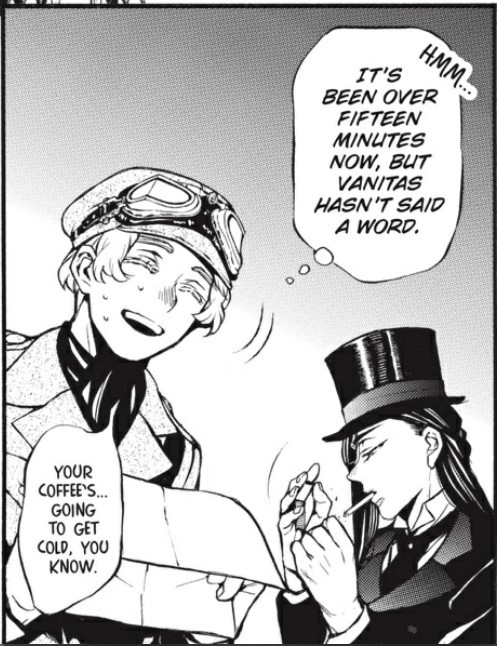
I also just want to point out that the smoking, the string of relationships, the casual dining, the flying, the actual job, all point to Roland being a fair amount older than Noé and Vanitas. Probably mid-20s about? I'm sure that he and Olivier are the same age, regardless, though potentially from different class backgrounds. Olivier is decked out in aristocratic garb and Roland is dressed for flying. That doesn't necessarily mean he's poorer, but the impression I get from him is that he's probably middle class at most. I think there was an extra that mentioned he supports his siblings? I'm not sure now.
Anyway, after those 15 minutes of awkward rambling, Vanitas finally gets around to the question he's been meaning to ask. Apparently, Roland knows all about it.
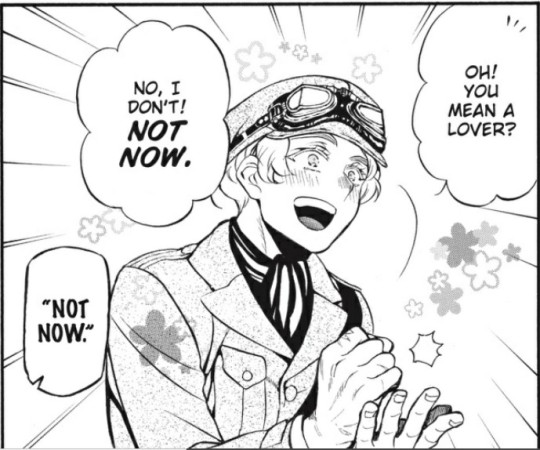
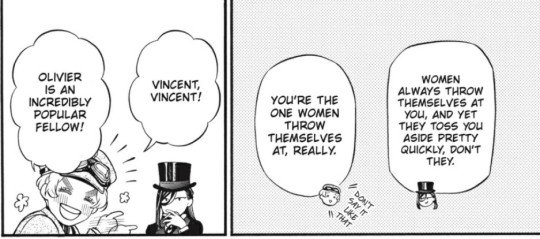
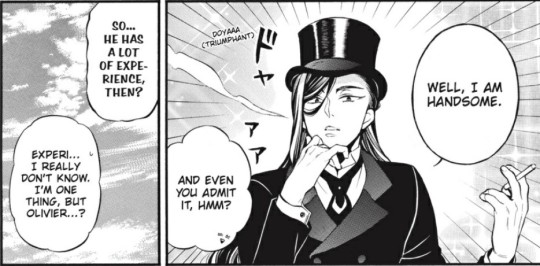
There's kind of a lot to cover in those three images. Roland has not only had past relationships, he's had several. Judging by Olivier's remark, they've all been remarkably short. One has to wonder if we're talking one-night-stand kind of short or it-lasted-for-a-week-before-my-preaching-became-too-much kind of short. Maybe Mochizuki will enlighten us someday. XD
But the most interesting thing is how hesitant Roland is to discuss Olivier's relationships and how Olivier doesn't even deign Vanitas's question with an answer. Yes, he's popular, but no, he's not going to talk about who he's with and neither is Roland. When Roland says "I'm one thing, but Olivier...?" it could mean a few things: he thinks it makes sense for himself to be "promiscuous" but the thought of Olivier being the same is impossible. Personally, I find this the most likely for now. Alternatively, it's one thing to casually discuss his own affairs, but gossiping about a friend goes against his code of honor and Vanitas is kind of asking a personal question. There is also a third possibility that Roland can't imagine Olivier with a woman. Olivier's popular, but he's not interested. Naturally, Roland wouldn't announce that to the world and it isn't particularly relevant to Vanitas's question anyway.
Whatever the reason, it subtly demonstrates how well the two know each other.
Vanitas finally gets to the heart of things, and it fits in with what I thought happened:
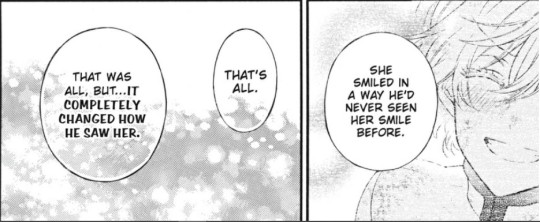
This really was the first time Vanitas saw Jeanne for who she was, as an actual person, and not just someone he can mess with. Before that particular moment, he truly knew nothing of Jeanne. Now, he's finally had a glimpse of her actual personality and it's incredibly genuine, forthright, and strong. Of course, now that he sees that, how can he not find her at least a little appealing? And how can he not now be forced to reckon with his past behavior? He was horrid, there's no getting around it. Regret isn't something Vanitas handles well along with, apparently, emotions in general. Hence his next dilemma:
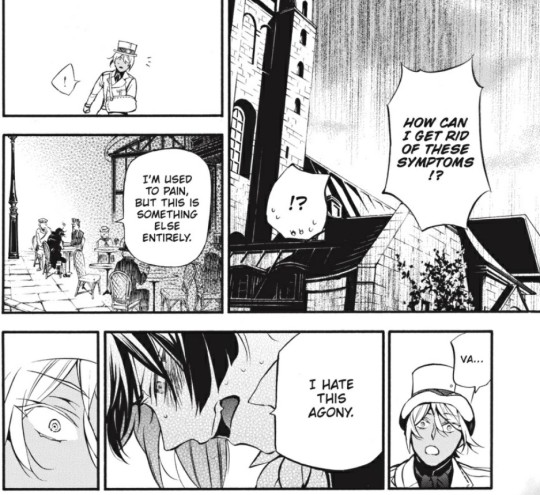
And at long last, Noé is finally seeing what the problem actually is. He didn't piece it together at Orlok's, but he's now hearing it from Vanitas directly. It's no wonder Noé surreptitiously sits away so he can listen. This whole time he's been wanting Vanitas to explain things to him, not just about the cold, but about love as well.

Roland is trying to be helpful here but, let's be honest, Vanitas is dropping a lot on him out of the blue, so I think it's understandable that he's a little confused right now.

And we finally get to the heart of the whole thing: Vanitas thinks he's a disgusting person. Someone like Jeanne definitely shouldn't love him because the only kind of person who could love him is someone who is as awful as he is and he's now been confronted with the fact that maybe Jeanne isn't. There relationship has a ton of issues, don't get me wrong, but Vanitas isn't seeing that; he's seeing that Jeanne has been kind to him, seems to care about him, and that definitely isn't the kind of person who would love him. Not genuinely.
The whole thing gets even more confusing if we take into account that his decidedly romantic moment with Jeanne reminded him of VotBM. They weren't having a romantic moment, but the discussion of affection, of hugs, were directly intertwined. Until we know more about VotBM I can't say if she was motherly or if things were decidedly more questionable there, but Vanitas must have gotten his twisted ideas about relationships from someone. Did VotBM have a bad relationship with someone? Did his past trauma simply color everything else in his life?

Olivier and Roland are understandably concerned, but it's Noé here that really stands out. He's pieced something together about Vanitas and now understands him a little bit better. After each arc, he and Vanitas have had a small conversation that brings them closer, but so far they haven't had that in this particular arc. My guess is it will be in the next chapter or the one after (since this one was labeled "part 1") and the arc will be wrapped up for good. There is, genuinely, a lot of stuff they need to cover about Gévaudan, Vanitas's relationship with Jeanne, and what they're doing next. There's also the small matter of Noé's injuries....
So, these two are going to have a lot to cover and Roland knows that right now, what Vanitas needs, is someone to talk to that he properly trusts. I almost wonder if he timed his dramatic God speech just so Noé could chase after him to begin with.
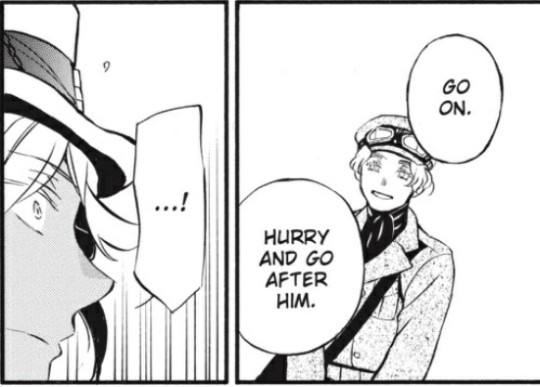
This really reads as "Go to him, Gilbert" and that amuses me.
Roland knew Noé was there the whole time (he's observant as we've mentioned) and he knows he and Vanitas have a powerful bond. He himself was inspired so much by it he changed his views on vampires completely. So, logically, he knows Noé needs to talk to Vanitas.
But Roland's motivations are still a bit harder to describe.
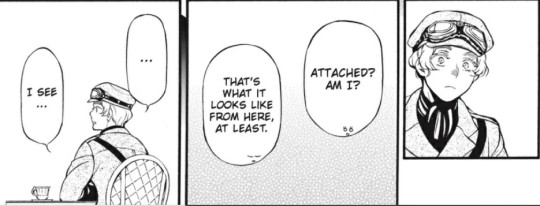
This much makes sense. The fact that he's had a string of lovers and doesn't seem particularly dejected by his constant breakups makes it obvious he wasn't particularly attached to any of them. He speaks about love as if he knows what it is, but he's never been that invested in a person to our knowledge. The only person we've seen him spend any length of time with is Olivier and they have a complicated relationship at best. Are we to assume he at least has an attachment to him? He threatened him before, but he also seems fond of him, and Olivier at least seems comfortable around Roland in turn.
And yet, Roland speaks of attachment as if it's a foreign thing to him. We know he has family, we know he has Olivier, he even has God, but like Olivier said: he believes in himself as a follower of God more than God Himself. Perhaps it's best said that the only thing we really know about Roland is that he's confident in himself, his own morals and beliefs.
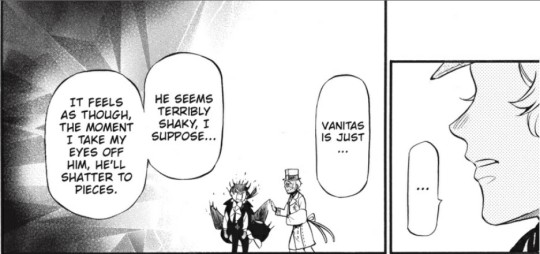
And I think that's how Vanitas fits into Roland's worldview to a certain extent. Vanitas is a project of sorts: Roland wants to save him, very much in the religious and physical sense, and he knows Vanitas is in danger every day at least physically. Perhaps he worries for his soul as well, not necessarily that he's going to Hell, but that he has lost himself and could "shatter" at any moment.
Oddly, Noé isn't brought up in this conversation whatsoever even though the person Roland showers with blatant affection is Noé, not Vanitas. This could very likely be because he knows Vanitas isn't receptive to that kind of thing; it's a tactic that works great with Noé, but definitely not with his companion and Roland is above all a calculative person.
And that's all I've got for now! I do like that Roland and Olivier dropped their serious conversation about an actual Vampire Eradication Unit to deal with Vanitas's love life. That's pretty supportive. XD Also, there's a Vampire Eradication Unit that Gano is a part of and if that isn't one of the main plot points of the next arc it will be soon enough.
Anyway, I look forward to seeing how Jeanne handled things. It looks like she's done at least moderately better than Vanitas, but most people would. XD
159 notes
·
View notes
Photo

Olivier, is a new character appearing in chapter 18 (volume 4). He's a friend (we suppose) and a comrade of Roland : He's, like him, one of the Chasseurs, at a probably similar rank. And just like Roland, his name refers to a character from "La Chanson de Roland" (Charlemagne). If you want to know more about these references, it is better to first read the part about Roland ;) (here => http://kuroleo-nightray.tumblr.com/post/168819732869/roland-known-as-roland-le-preux-is-a-frankish)
Once you have read it, or if you already knew, we can continue! Olivier takes his name from Olivier de Vienne (or de Gennes), he is one of the characters very present in the Song of Roland, but unlike Roland, he is a completely fictional character. Indeed, Roland really existed, but entered the Legend much later in the texts of the "Chanson de Roland" or some facts are modified, embellished, and invented for others. Olivier is in these texts the close friend of Roland, his confidant and his advisor. He is also one of Charlemagne's 12 companion knights. He is described as a very courageous character, of great wisdom and a great composure in battle. As opposed to Roland, named Roland le Preux, he is sometimes called Olivier le Sage.
We can find some things of this relationship already, in Vanitas no Carte, between Olivier and Roland ^^ Indeed, they are friends and comrades of combat, and Olivier tries to calm Roland, and the adviser, although this one does not seem much to listen to it. The weapon of Olivier de Vienne is called Hauteclair, so we can assume that if Olivier de Vanitas no Carte has a weapon, it will also bear this name, just as the weapon of Roland is called Durandal, as the legendary sword of Roland le Preux.
In the Chanson de Roland, Olivier is the nephew of Girard, at war for 7 years against Charlemagne. It is to put an end to this conflict that Girard chose Olivier and Charlemagne Roland as champions, for a duel. This is how they meet, compete and fight. Recognizing each other's valor and nobility, they become friends and restore peace. Olivier will be mortally wounded and lose his life in the same battle as Roland, that of Roncevaux, in 778.
Can we predict with this a fatal future for our Roland and Olivier? We'll see, but with Jun Mochizuki, it's still possible ^^
#LeoVanitas
#vanitas no carte#les mémoires de vanitas#the case study of vanitas#jun mochizuki#references#roland fortis#olivier
57 notes
·
View notes
Text
VNC Chapter 43 Analysis
Wow, for chapter designed to segue between one arc to the next, this one sure had a lot packed into it! The political intrigue is through the roof and our main characters take a backseat while we finally get to see Dominique and her family once more. Before that, though, a few last thoughts on Gévaudan. We learned both Chloé's and Jean-Jacques's names and they, indeed, suit them well. Chloé's was "Canorus," or "she who plays with snow crystals." She'd isolated herself in a snowy castle and she played the piano to exert her power, which has white keys. It also implies a more lighthearted nature to Chloé than we really got to see, which seems accurate to me. Jean-Jacques's is "Aprix" or "he who nestles close to the last snows." His is especially overt in its meaning: he loves the snow (Chloé) and stays close to her side. Jean-Jacques is also the easiest vampire to cure we've seen to date and the reason is simple: he only gave his name to Naenia to protect Chloé. If he doesn't need to do so to protect her, then why bother?
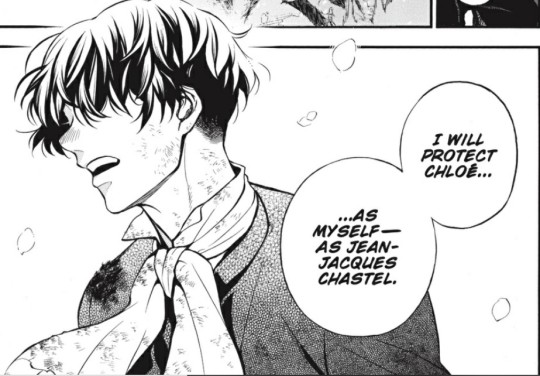
He will now protect her as himself, his true self, without any outside help. I can't help but wonder how soon he will have to live up to that promise. We also finally get something of an update on Johann and Dante.
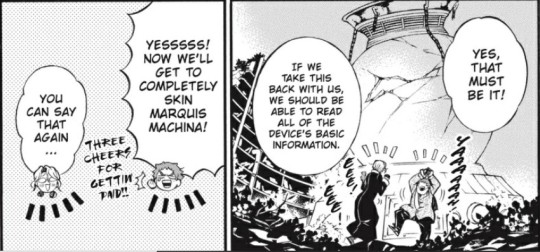
Okay, so we already knew these two were hired by Marquis Machina, we just didn't know what it was they were looking for. Turns out, the whole reason they were there was for Chloé's alteration device. This actually makes perfect sense: it contains information and that's precisely what dhampirs collect. Furthermore, it seems information is what Marquis Machina is most interested in as well, so things are adding up nicely.
Unfortunately, (or thankfully?) Marquis Machina doesn't get whatever information this device has because of the chasseurs and Ruthven. I think it's safe to say at this point that there are certain members of the Church that are allied with Ruthven. Furthermore, they are almost certainly trying to reignite a war between humans and vampires.
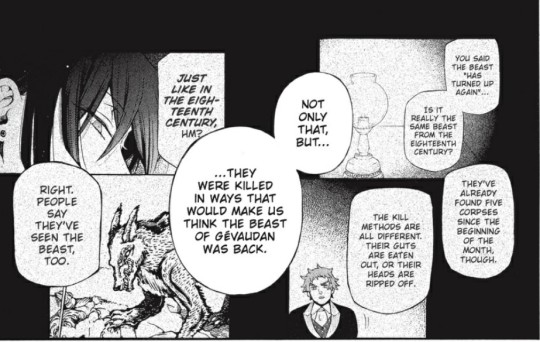
Having these two groups working together is nothing short of a disaster because it's a very effective team up and no one even suspects what's going on, save for possibly Marquis Machina who is familiar with both Ruthven and Chloé, but I'll talk a bit more about that in a bit. Also, I think we now know why Astolfo was sent to Gévaudan:
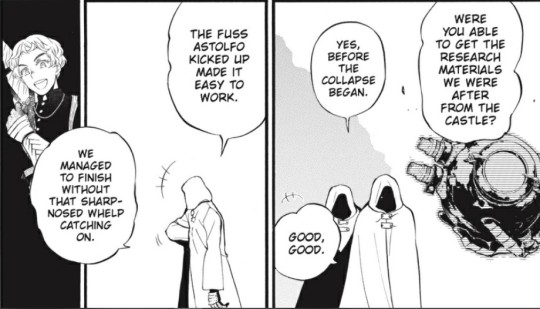
Now this is just sinister. Astolfo was purposefully sent because they know he has no restraint. They know he's angry, looking for purpose, and they're manipulating those emotions into something beneficial for them. It also means they know Roland is questioning the Church; they had to make sure he was sufficiently distracted in order to get what they came for. And who was in charge of all this? None other than Gano, the mysterious chasseur that was supposed to come as backup a couple chapters ago. I guess now we know what the holdup was about.
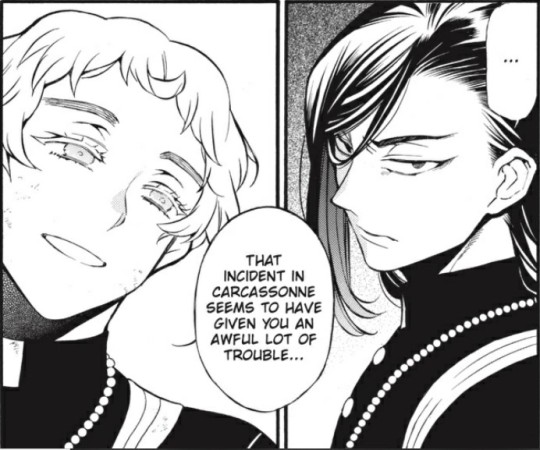
There is not a lot of love lost here, is there? Olivier is looking at Gano with overt mistrust and disdain. Roland has his relaxed grin firmly in place, but I think we know enough about him at this point not to blindly believe it: he knows there's something up with Gano and he knows that whatever happened in Carcassonne shouldn't have taken that long. I think we now have a physical representation of why Olivier is so worried about Roland's behavior. He knows people like Gano are aware of his treasonous thoughts and he knows Roland is in danger. I think it's also safe to say that Olivier isn't a big fan of a lot of people in the Church, which fits in with the leeway he's given Roland and his extreme opinions (in the Church's eyes at least). As for this Gano...
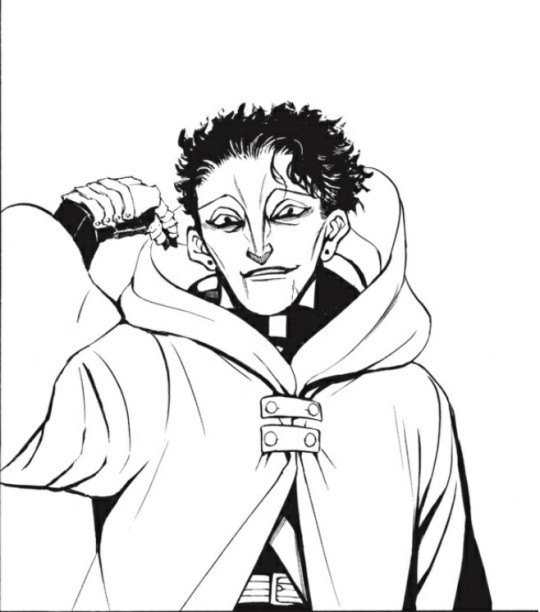
That is one of the most suspicious individuals I've ever seen. 8D My goodness, Mochizuki isn't doing much to give him the benefit of the doubt, is she? XD He's all but leering at them; he knows something they don't. No wonder Olivier looks so irritated. I wouldn't be surprised if Gano is an extremely powerful chasseur. All the more reason for Roland to be careful in his investigation of things. Another major thing before we jump into the de Sade drama:
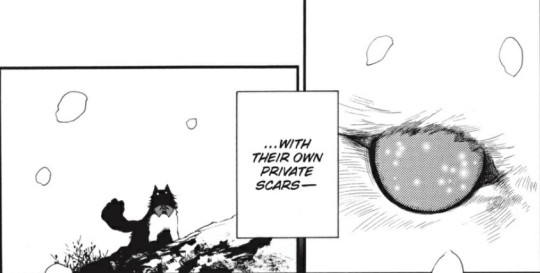
I KNEW IT. I KNEW IT, BUT I CAN'T BELIEVE IT, I-- *ahem* So, Murr is a shady cat. :D Either Teacher is the cat or, more likely, he's watching everything through the cat, which is still pretty disturbing. Think about it: Noé has been put through the wringer repeatedly, and Teacher hasn't lifted a finger to help him. Noé was nearly killed by Ruthven on two separate occasions, nearly died in the catacombs, lost a limb most recently, and I'm sure it's only going to get worse. The only time Teacher offered any help was when Noé was asleep and even then he wasn't so much helping as he was listening to Noé's troubles, no doubt because he was curious what Noé would do. It's Louis all over again, just with some adjustments for Noé's personality. Anyway, that wraps up the Gévaudan arc pretty neatly. I doubt this is the last we'll see of Chloé and Jean-Jacques, though. You don't spend this much time developing two characters simply to drop them by the wayside for the next arc. I have two guesses on how this could go: Chloé and Jean-Jacques will show up later in the series to support Noé or to offer some knowledge on Ruthven. Alternatively, they will be sacrificed in the near future to prevent that information from getting out. Either way, for the moment, Vanitas and Noé are allowed to bask in their victory and feel as if they've accomplished something, which they have, but there is so much manipulation in this series I'm feeling uncertain about how long they'll get to enjoy it. And at long last, we get to see Dominique again! None of our questions about Misha are answered, though, and if anything, I'm more worried about what happened to her than ever. She thinks all of that was a dream? What did he do to her?
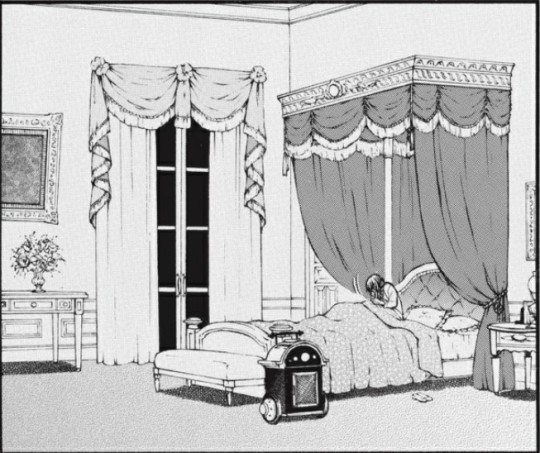
Everything seems to be in order. Her bedroom is clean, there's no sign of struggle, she isn't missing anything... It makes everything that much more alarming. How long has she been sleeping? What happened after she met Misha? Quite a bit of time has passed, so that seems to indicate, to me, that if she's still dreaming about Misha, something bad happened that she can't remember. There seem to be a lot of memory issues in this series. After all, if you can't remember something, you can't very well exercise your will over a situation, can you? Dominique is desperate to get outside, but she's immediately confronted by her sister, Veronica.
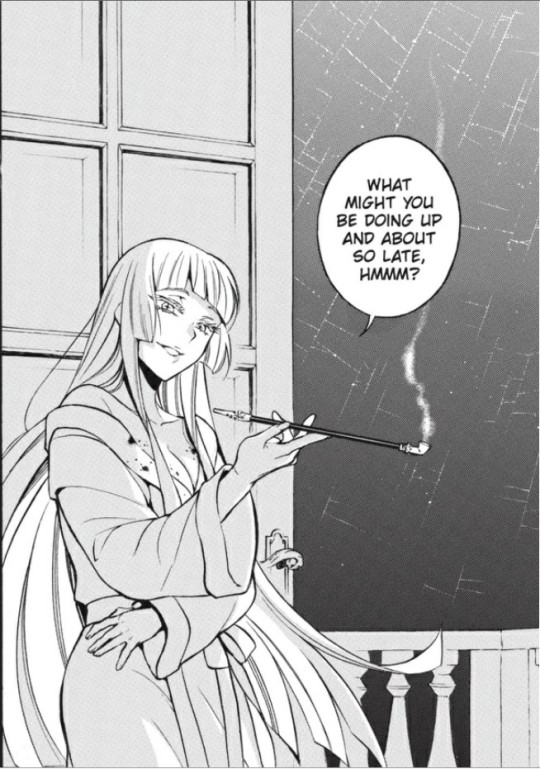
There's a familiarity between these two that shows they were probably raised together, but there isn't any closeness, which means they weren't raised to have especially strong bonds with one another. It's an interesting dynamic and feels both sinister and aristocratic. Now, Veronica says she's covered in blood because she was having an intimate moment with Marquis Machina. However, I feel the need to point out, there's no reason we should believe her. We didn't see the marquis anywhere, after all. However, she has information on the senate meeting that she could only have gotten from someone in the senate, so there's probably some truth to what she's saying. Personally, I find this a curious change of attitude for Veronica. I thought she was a bit of a misandrist if I'm completely honest. This is the woman who said, "What is a human doing here? Not only that, but a man. What a stench. The stink of humans is so strong I think my nose may drop off." I suppose her biggest issue was that he was a human (so, she's a xenophobe and/or racist), but his being a man didn't seem to help. Still, people who are bigoted often get together with the very people they have issues with. In that regard, Veronica and Vanitas are kind of similar. 8D Vanitas definitely has misogynistic tendencies and he's trying to have a relationship with a woman. Likewise, Veronica may have issues with men, but she's having a fling with one. All right, then. It is true that she and the marquis interacted with one another in volume two:
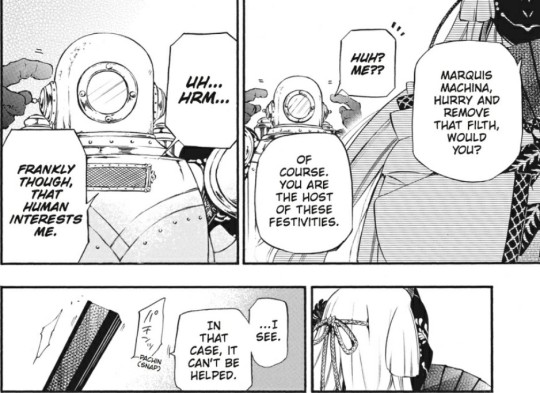
It's extremely subtle, but the fact she didn't just go ballistic on the marquis when he didn't handle the problem could indicate a certain fondness for the guy. Anyway, the important bit for now is Dominique's reaction to this revelation: she seems a whole lot like Noé all of a sudden. Dominique: Marquis Machina got you all bloody, Veronica? Why...? This is kind of odd for Dominique. She normally seems way more worldly than this, not to mention way more on top of things. This seems more like the Dominique we saw in flashbacks, and I suppose that makes sense. She just woke from a nightmare, she's feeling disoriented, and her sister is messing with her. Not a great time of things. Furthermore, her sister says this:
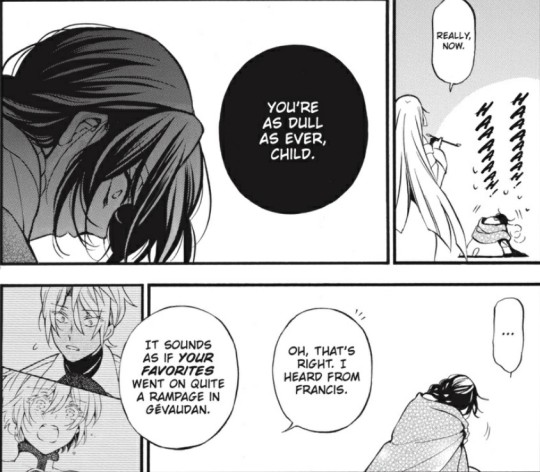
"You're as dull as ever, child." This is in direct reference to Dominique being uncomfortable hearing about Veronica's sexual conquests. This strongly implies Dominique isn't having her own sexual conquests, despite her being so flirtatious in previous chapters. Put that together with Veronica referring to Noé and Jeanne as Dominique's "favorites" and I think it's safe to say that at the moment, Dominique is harboring unrequited romantic feelings for both of these individuals and Veronica find the whole thing contemptible. As an aside, this means Dominique and Vanitas are kind of similar, too. 8D In fact, both of them are having more luck with Jeanne than they are with Noé. Jeanne seemed quite taken with Dominique and their dance going so far as to keep pursuing her afterwards, and she has become much more fond of Vanitas. Meanwhile, Vanitas's almost-pursuit of Noé at the beginning of the series* has gotten exactly nowhere, much like Dominique's. I'm not sure what that says, exactly, except that Jeanne might be more romantically inclined than Noé. Or, perhaps, Noé is even more oblivious than Jeanne to this stuff. Still, both Vanitas and Dominique are very close to Noé, so maybe it's a matter of time. Anyway, we then get into the political spectrum of things, and this is no doubt what a lot of the next arc will be dealing with. We're introduced to several senate members, and none of them seem trustworthy.
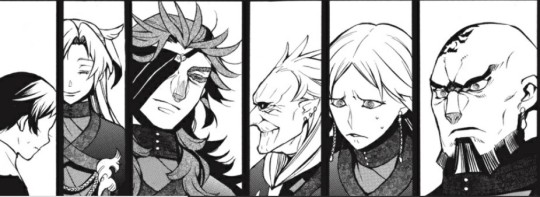
From right-to-left we have: Lord Bellator (the Fuming), Unnamed Lord (the Nervous), Lord Paldence (the Sly), Lord Ruthven (the Liar), Antoine (probably a lord? I'll call him "the Diplomat" and in this instance that's not necessarily a good thing), and Master Luca (heir to the throne AKA "the Prince"). I think it's interesting that in the overhead shot, we're shown there are eight senate members, but in this closeup we're only shown five, not counting Luca. We know Marquis Machina was there (though notably his face wasn't shown), that raises the number to six. That means there were two members there we still know nothing about, not to mention The Nervous, who was never given a name. It seems Bellator and Ruthven are not each other's biggest fans. In fact, most of the meeting that we are shown is of these two going at each other's throats.
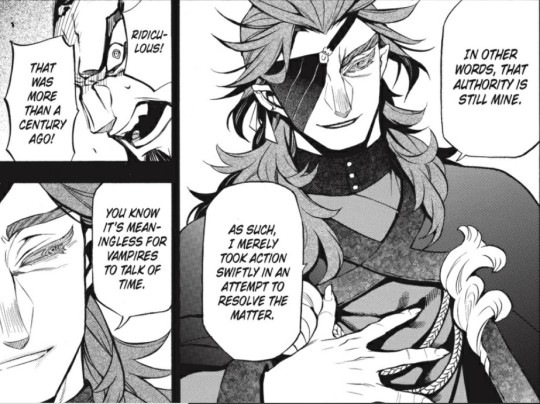
Ruthven's comment here makes it pretty obvious that vampires live for a ridiculously long amount of time, but even vampires agree that acting like you can do whatever you want because of a conversation from a century ago is kind of pushing it. It also implies that the people on the senate have been on the senate for a ridiculously long amount of time. In other words, they are set in their ways; there's been no new fresh blood. The political side to vampiric society is probably insanely outdated compared to humanity's and that's saying something for a series taking place in the 19th century--it's not just that certain families stay in power for years and years; literally the exact same people maintain that power. No change. No advances. They are stuck. Anyway. Dominique doesn't want Jeanne to be executed, understandably, and she reveals this weakness to Veronica.
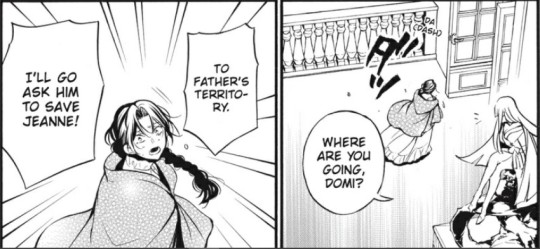
Veronica berates her for trying to drag the family name through the mud; apparently, no one likes a bourreau. But what I find interesting is that Dominique says "Father's territory." Um... what? So, they live in this giant mansion and the father has his own territory? What about the mother? Do they mean territory as in he invaded and took over some spot or do they mean he just really needs his space? Either way, this is further evidence that this family is not very close; they are some kind of political enterprise. I really feel bad for Dominique, though. She's kind of out of it, but she immediately goes to Jeanne's rescue. Gotta admire that. Anyway, Antoine finally shows up and all of that is taken care of.
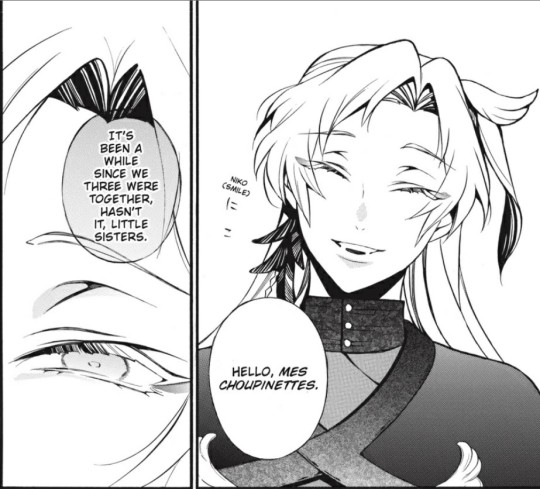
Antoine's sudden appearance is jarring, to say the least. Also, his fangs are out. Now, who was hanging out in the hallway with blood on her? Veronica. Who just showed up with his fangs bared? Antoine. Who seems incredibly shady? Both of them. There's probably nothing to this, but if there's going to be some kind of bizarre, incestuous affair going on, I wouldn't be shocked to discover it was with the de Sades. Regardless of potential crack theories, Antoine gives us even more information on what happened at the senate meeting. This makes it pretty clear to me that Antoine is kind of the head of the house. Why didn't their father go? Apparently because he has an entire territory to himself, I don't know. Thus, the responsibility falls to Antoine. Luckily for the de Sade family, he seems remarkably good at this job. He easily maneuvered Bellator into doing what he wanted and got the senate to cool down as well.
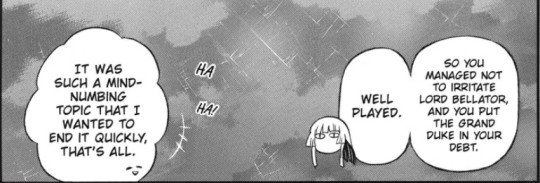
Even Veronica is impressed. He says he just wanted to move on from the topic, and I almost believe him, but there's no doubt he benefited from the whole thing as well. But he continues on, and it raises some questions.
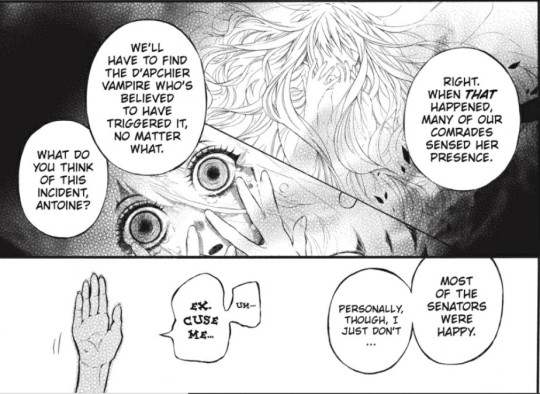
What does he mean by "comrades?" It could be the other senate members, but Dominique thinks she shouldn't be hearing about this, which she didn't say previously. It makes me think that the de Sades are involved in something a little more nefarious than mere politics. If they're aligned with Ruthven, then I suppose it's the Church and they want a war. If not, then I have no idea; there are quite a few possibilities there. Perhaps loyalists to the queen? Either way, he isn't sure the queen's reappearance is a good thing, understandably, too. It would change the power dynamics for certain. We then get to see Marquis Machina speak with Ruthven, and, boy, are there some layers in that conversation.
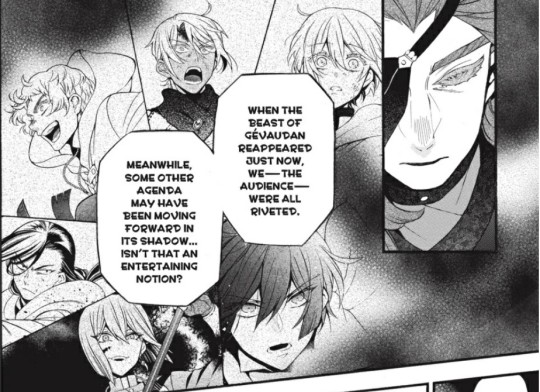
In other words, Machina knows something was afoot, and he's letting Ruthven know he knows he had something to do with it. It also means that literally every single person involved in the Gévaudan incident was a pawn.
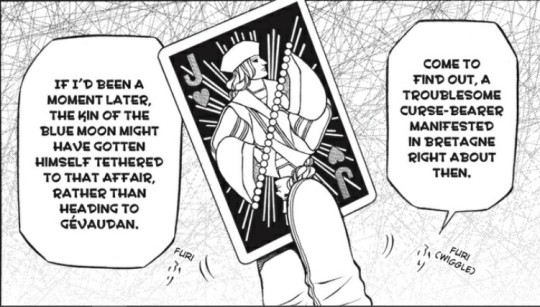
Ahh, now this raises the question: who is the chess master? At first, it's easy to think it's Ruthven. But now we see that Machina was manipulating quite a few things: the dhampirs, Noé, and Vanitas. A section of the chasseurs were squarely in Ruthven's control, however, so what we're seeing here is a power struggle between Ruthven and Machina. Who knows which of them will win that particular battle? For the moment, Ruthven is ahead simply because he got the device from Gévaudan, but who knows how long he'll be able to keep the edge.
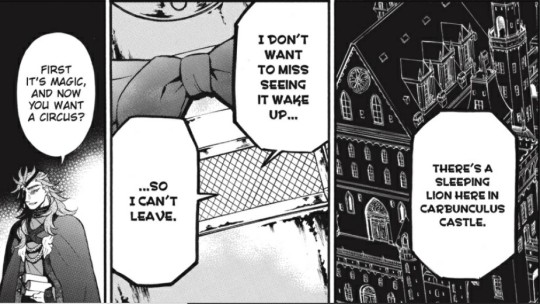
I'm almost certain Machina is referring to Ruthven here. He's certainly been causing a lot of trouble in secret. On the other hand, "lion" has noble associations, so it could be Luca's rise to power. He beared his fangs at this meeting and saved Jeanne. Perhaps Machina is curious to see whether he can maintain the throne. Ruthven is still the more likely choice judging by the panel that follows:
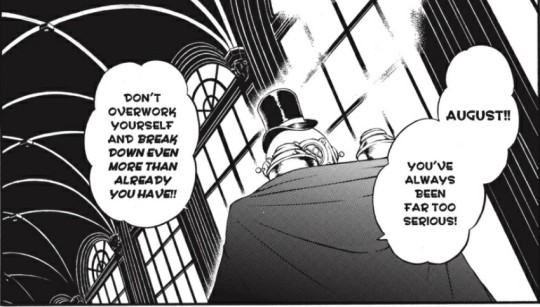
Machina knows Ruthven is teetering on the edge, and he wants to see the man fall. This next arc is going to be something. There are so many threads in this introductory chapter alone that I think it's safe to say we're in for a wild ride. After all that, we get a brief glimpse of Noé and Vanitas back at the hotel.

We have a bit of a time skip; they've been back in Paris for ten days, and Noé is only now growing concerned that Vanitas has been sleeping solidly for all of them. Um, Noé, you probably should have checked after the first day.... We can also see that Noé is wearing a brace and that it looks like they're trying to reattach his hand. I am ... so curious about whether that works. Just let me know, Mochizuki, please.... Noé also gets to see Vanitas's sleeping face at long last! XD
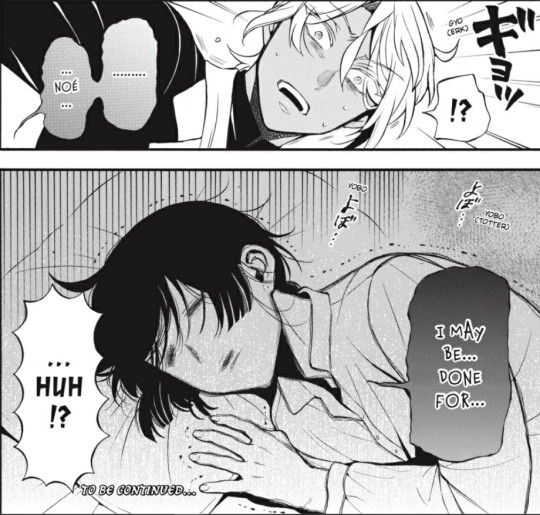
What even, Vanitas. XD I can't tell if he's actually sick or if he's completely drained from how emotionally vulnerable he was for the entire Gévaudan arc. He was literally worrying about Noé for the entire arc, then he was worrying about his promise to Jeanne, then he was panicking about how fond Jeanne was of him suddenly and his own reaction to it. Yeah, I don't think he was prepared for literally anything in that arc. XD Guess we'll see how that continues later this month! I really need to see it.... *I've talked about that in previous installments, so I opted not to bog things down further by getting into it here, but if it seems unclear feel free to ask about it. :)
75 notes
·
View notes